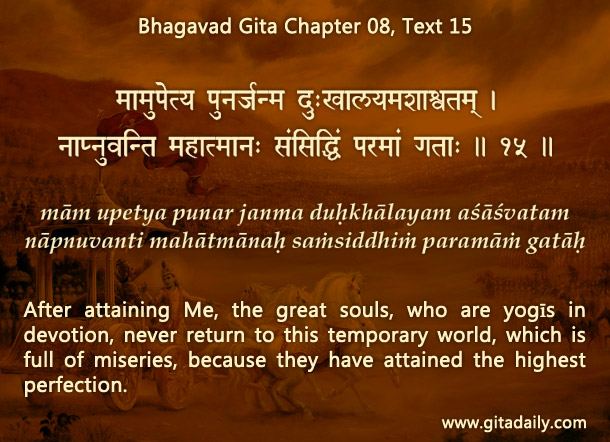When some adversity afflicts us, grief is natural and understandable. Still, after we have given our emotions the necessary vent, we need to counter the mind’s sorry story, which it often spins amidst suffering. Its story usually runs along these lines: “Everyone is enjoying. I alone am suffering. Life is so unfair to me.” This tale worsens our misery by adding feelings of isolation, alienation and victimization.
The reality, as opposed to the mind’s tale, is that we are not alone in our distress. True, others’ problems may not be as grave as ours. But then, some others’ problems may be far graver. The Bhagavad-gita (08.15) states that this world is a place of misery. Meditating on suffering’s universality deflates the mind’s fantasy that happiness is just a few adjustments away – adjustments that others have been able to do, but we haven’t. Freed from this fantasy, we can integrate with material existence’s unpalatable yet undeniable reality: everyone has problems.
More importantly, the Gita helps us see suffering as an impetus for integrating with spiritual reality. The same verse stresses that those who devote themselves to Krishna go beyond this world, uniting with him for a life of eternal love. Even in this world, the more we become absorbed in Krishna by practicing bhakti-yoga, the more we access a spiritual shelter that transcends our material condition.
Moreover, when we experience bhakti’s shelter amidst our specific suffering, that realization can help us connect with others who are suffering similarly. After we have healed sufficiently, we can empathically share with them our realized conviction that bhakti can shelter and heal them too.
Thus, suffering can serve a dual purpose: an impetus for us to go closer to Krishna and a bond that links us with others, thereby helping others come closer to him.
To know more about this verse, please click on the image
Explanation of article:
Podcast:


Wonderful realisation. Four distinct benefits of meditating on this verse has been brought out in this article.
Thank you very much Prabhu.
Thank you, Muralidhara P, for your keen analytical appreciation.